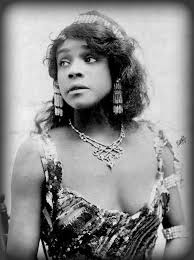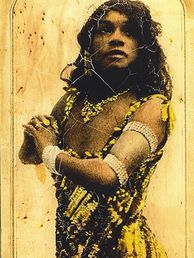Difference between revisions of "Salome's Dance (1908 Overton Walker), solo dance"
| (13 intermediate revisions by the same user not shown) | |||
| Line 1: | Line 1: | ||
[[File: | [[File:Salome2 Aida Overton-Walker.jpg|thumb|250px|[[Aida Overton Walker]] as [[Salome]]]] | ||
[[File: | [[File:Salome Aida Overton-Walker.jpg|thumb|194px|[[Aida Overton Walker]] as [[Salome]]]] | ||
'''The Vision of Salome ''' ( | '''The Vision of Salome ''' (1908) is a vaudeville ballet by [[Aida Overton Walker]] (chor.). | ||
==Abstract== | ==Abstract== | ||
[[Aida Overton Walker]] contributed to the "Salomania" of those years with her solo performance of the “Salome” dance, which she introduced in the Broadway show ''Bandana Land'' on August 27, 1908. As an African-American dancer she was well aware of how the roles she played affected race relations of the time. Her portrayal of the [[Salome]] character was very different from that of the other dancers and actresses of her time. She worked hard to break the stereotypes of black women as immoral and oversexed. She downplayed the erotic aspects of the Salome dance. Instead, Walker chose to emphasize the dramatic elements of the performance, coordinating her movements and expressions in order to convey the internal thoughts and emotions of the Salome character. The result was a dignified, sympathetic Salome and a technically innovative dance that “transformed the role of a highly sexualized dancer . . . into a dramatic achievement”. Aida's performance was so successful that she was asked to perform it again, in 1912 at Hammerstein's Victoria Theatre. | |||
==Original cast== | ==Original cast== | ||
*[[Aida Overton | *[[Aida Overton Walker]] = [[Salome (dance)]] | ||
==Editions, performances== | ==Editions, performances== | ||
Premiered in New York, NY: 1908. | Premiered in New York, NY: Majestic Theatre, 27 August 1908. | ||
==External links== | ==External links== | ||
| Line 24: | Line 24: | ||
[[Category:Music--1900s|1908 Overton]] | [[Category:Music--1900s|1908 Overton]] | ||
[[Category: | [[Category:Dance--1900s|1912 Overton]] | ||
[[Category:Solo dances|1912 Overton]] | |||
[[Category:English language--1900s|1908 Overton]] | [[Category:English language--1900s|1908 Overton]] | ||
| Line 34: | Line 36: | ||
[[Category:Salome (subject)|1908 Overton]] | [[Category:Salome (subject)|1908 Overton]] | ||
[[Category:Salome-- | [[Category:Salome--dance (subject)|1908 Overton]] | ||
Latest revision as of 13:47, 10 November 2019
The Vision of Salome (1908) is a vaudeville ballet by Aida Overton Walker (chor.).
Abstract
Aida Overton Walker contributed to the "Salomania" of those years with her solo performance of the “Salome” dance, which she introduced in the Broadway show Bandana Land on August 27, 1908. As an African-American dancer she was well aware of how the roles she played affected race relations of the time. Her portrayal of the Salome character was very different from that of the other dancers and actresses of her time. She worked hard to break the stereotypes of black women as immoral and oversexed. She downplayed the erotic aspects of the Salome dance. Instead, Walker chose to emphasize the dramatic elements of the performance, coordinating her movements and expressions in order to convey the internal thoughts and emotions of the Salome character. The result was a dignified, sympathetic Salome and a technically innovative dance that “transformed the role of a highly sexualized dancer . . . into a dramatic achievement”. Aida's performance was so successful that she was asked to perform it again, in 1912 at Hammerstein's Victoria Theatre.
Original cast
Editions, performances
Premiered in New York, NY: Majestic Theatre, 27 August 1908.

